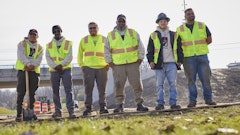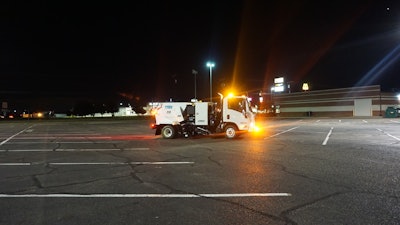
More and more contractors are working nights to accommodate clients, but parking lot sweeper operators have been working nights since the first sweeper hit the first grocery store parking lot.
And ever since, operators and sweeping company owners have struggled with how to get the work done while keeping worker safety, personal health, and personal lifestyle in mind, given that the on-the-job hours are the opposite of our body’s circadian rhythms.
According to Circadian, a research and consulting firm that helps workers and companies cope with night shifts, our circadian rhythms fluctuate over a 24-hour period. The body responds in certain ways during the day and in other ways at night. Sweeper operators who work the overnight shift are challenging those circadian rhythms and need to be aware of the potential problems and how to minimize them.
“Your body is designed to sleep at night, making night work a challenge,” notes Working Nights Health & Safety Guide. “Virtually all of your bodily functions have circadian rhythms that are controlled by the biological clock in your brain. This clock, in turn, is influenced by sunlight and darkness. Understanding how your body works is a first step toward successfully coping with shiftwork.”
Working Nights explains that circadian rhythms peak during the daytime: • Your energy level increases • Your body temperature rises • Your digestive system gears up in anticipation of a meal • Your coordination and physical ability are enhanced • Your eyes focus easily
But in the mid-afternoon and overnight, everyone’s circadian rhythm dips: • Sleepiness comes in waves • Your head feels heavy • You don’t feel hungry • Your reaction time slows • Your memory is not as sharp
It’s this dip in the circadian rhythm that operators sweeping parking lots must confront.
“If you’re on the night shift, you have to keep working even though your alertness level drops to the low point in the circadian cycle during the wee hours of the morning,” Working Nights notes. “As your attention drifts, your mind wanders. Careless errors tend to occur, sometimes with grave consequences. You may miss things you would normally recognize and respond to.”
The following insights, questions, and answers will help those working overnight be more alert and work more safely as they integrate their work schedule into their life.
What Are the “At-risk” Hours of Overnight Work?
Circadian points out that anyone working what is often referred to as a third shift runs an increased risk for having an accident, simply because they are working at night, in opposition to their circadian rhythm. “It’s no coincidence that industrial accidents at Three Mile Island, Chernobyl, and Bhopal all occurred during the overnight hours,” according to Working Nights.
Working overnight can lead to problems such as: • Chronic sleep deprivation • Disrupted sleep patterns • Reduced alertness or vigilance • Increased accidents • Nodding off while working or driving • Low morale, decreased motivation and job burnout • Decreased productivity
And while working at night creates more risks in general, parts of the overnight shift can be considered high-risk times at which operators are most at risk for fatigue-related safety problems: • Between 1 a.m. and 6 a.m. • The first two night shifts after working “days” or after several days off • Early hours of the day shift • Near the end of your shift • When activity levels are high in your work area • Driving home after the night shift
What Are the Warning Signs of Fatigue?
Simply being aware of these high-risk times can help operators work more safely. But operators can also manage their fatigue better and enhance their alertness if they learn to recognize how fatigued they are. Common warning signs of fatigue include:
· Physical Changes such as sleepiness or difficulty keeping eyes open, excessive yawning, blurred vision or loss of focus, sluggishness, or lack of energy
· Changes in behavior/mood such as irritability, an inability to concentrate, becoming quiet and more withdrawn, lack of motivation
· Mental/intellectual changes including difficulty concentrating, an inability to remember what you did in the last five minutes, difficulty starting and completing tasks
How Can You Improve Your Energy & Alertness?
Understanding what takes place with your body and mind is the first step to a better life while working overnight. The next step is to adjust behavior based on those warning signs.
- Become aware of your “biological clock time” so you can schedule a break during expected drowsy periods
- Take a nap before coming into work (see below)
- Play a mental game to keep your mind active
- Talk to a co-worker or dispatch about a common interest for just a few minutes to stimulate your mind
- Seek opportunities to get out of your sweeper to work
- Take a walk on your break
- Stretch or do isometric exercises
- Drink caffeinated coffee, tea, or soda – but don’t overdo the caffeine
- Be aware that many prescription and over-the-counter cold and allergy medications can make you drowsy
- Snack on pretzels, fruit, or vegetables; avoid candy and other sugary foods
- Wear layers of clothing that you can add or shed depending on your body temperature
- Keep your sweeper cab cool (below 70 F) and well-ventilated
- If permitted, turn on a radio
Working Nights points out that driving home in the morning after a night shift is one of the most dangerous parts of the day. During that drive, night workers are at high risk for microsleeps or Automatic Behavior Syndrome (see sidebar).
There are steps you can take to protect against accidents on your way home:
- Make sure you get the sleep you need; getting less than six hours adds to your risk
- Take a short nap before leaving work
- Carpool — having a passenger helps keep you alert
- Call a cab or have someone drive you home
- Vary your route home
- Never assume you can “will yourself” to stay awake at the wheel—you can’t
How Can You Handle Common Substances that Affect Sleep?
The most-commonly used substances that affect sleep are caffeine, alcohol, nicotine and sleeping pills.
- Caffeine. Caffeine works quickly (within 15 minutes), temporarily increasing alertness, and improving reaction time, energy levels, and sometimes performance. But it also can disrupt sleep because it takes a long time to wash out of the body. • Use caffeine in moderation and save it for when you get most tired during your shift • Avoid caffeine three to four hours before you want to go to sleep • Substitute caffein-free drinks • Heavy users should gradually cut back on caffeine
- Alcohol. A couple of alcoholic drinks might help you fall asleep, but the sleep will be of poor quality. Never mix alcohol with sleeping pills.
- Nicotine. Nicotine temporarily increases alertness, but the harmful effects of smoking far outweigh the alertness-enhancing benefits. Not only is smoking linked to cancer and other health issues, your body continues to crave nicotine while sleeping so your sleep is disrupted. And every boost you get from nicotine is followed by a letdown, so you want another hit of nicotine. Try to quit smoking, cut back, or switch to a reduced-tar and/or reduced-nicotine brand.
- Sleeping pills, non-prescription sleep aids. Sleeping pills can have side effects including dependency, disrupted sleep, and fatigue upon awakening. They are usually okay to use under your doctor’s guidance but avoid taking them on a regular basis.
Should You Be Napping?
Research indicates that some times are better than others for napping. Many people experience a natural daily dip in alertness around 2:00 or 3:00 p.m. If you’re working from 11:00 p.m. to 7:00 a.m. and only sleep from 8:00 a.m. to noon, you may be able to nap easily in the late afternoon.
A nap should be either very short (15 to 20 minutes) or long (about 90 minutes). With a brief nap you don’t enter the deeper stages of sleep and wake up feeling alert and refreshed. A 90-minute nap, on the other hand, allows you to complete a full sleep cycle and you’ll likely wake up feeling alert and refreshed. If you wake from a deeper sleep – but not 90 minutes – you’re likely to feel groggy and disoriented.
You need to experiment to find the time of day and length of nap that works best for you.
What Should Sweeper Operators Be Eating?
There’s a relationship between the foods you eat and your energy and alertness when working overnight. Unfortunately, the foods that are most readily available to sweeper operators on the go are exactly the foods they shouldn’t be eating. When working overnight it’s best to avoid:
- Fatty meats
- Fried foods
- Pastries
- Potato and corn chips
- Subs and pizza
- Whole milk dairy products
All foods to access too easily on a sweeper route, right? Instead, try switching to these foods that provide energy over a long night going from parking lot to parking lot:- Pasta, rice, and potatoes, particularly whole wheat pasta, brown rice, and sweet potatoes, which contain more fiber and nutrients
- Whole grain breads and cereals
- Fruit and vegetables
- Fish, lean meats (such as skinless chicken and turkey)
- Soybeans, tofu and beans
- Skim or low-fat milk and cheese products
Clearly not as easily accessible as the “foods to avoid” list. So perhaps the best way to make sure you’re eating the best foods for overnight work is to bring your own food. Here are some tips on what to include in your brown bag:
- Sandwiches. Use whole wheat, rye, or oatmeal bread, and substitute a bagel, an English muffin, or pita bread once in a while. Between those healthy bread slices try chicken, tuna, turkey, lean beef, seafood, low-fat cheese, or a reasonable amount of peanut butter with low-sugar jam. Top appropriate sandwiches with lettuce, tomato, onions, zucchini, and just about any other vegetable.
- Soup. You can’t go wrong with chicken or vegetable soups containing pasta or rice. While this might be more difficult out on a sweeper route, having healthy soup on hand in a thermos can provide a nice energy boost.
- Salads. These, too, might be difficult to eat during a parking lot sweeping shift, but that doesn’t mean you should avoid them. Include a variety of greens, a healthy protein, and a variety of fresh vegetables. Apply a reasonable amount of a low-fat dressing.
- Snacks. Many people reach for candy bars or donuts to get an energy boost – and they do provide that. But it lasts only about 20 minutes and most people feel even more fatigued after that “sugar high” wears off. Stick with fresh fruit, unsalted pretzels, fig bars, low-fat crackers, low-fat yogurt, graham crackers, or even dry sugar-free cereal to get a solid energy boost.
What Should You Be Drinking?
We’ve already discussed caffeine drinks and when to drink (or avoid) them, but the best thing you can do to keep your energy level high and maintain overall health is to drink water. When you hydrate, your major organs don’t have to work as hard. Water also aids digestion, and helps prevent obesity, poor muscle tone and muscle soreness.
- Drink 8 to 10 glasses a day
- Don’t wait until you’re thirsty, drink regularly
- Avoid sports drinks, which are often high in sugar and sodium
- Limit caffeine and alcohol, which are diuretics that flush needed water out of the body
Operators of parking lot sweepers face challenges others don’t, simply because of the hours they work. Operators who are proactive – and employers who are proactive – can minimize problems associated with working overnight and can create a safer and more enjoyable work and life experience.
Information from this article is from Working Nights Health & Safety Guide, written by Martin Moore-Ede, founder and CEO of Circadian (www.circadian.com). Circadian publishes monthly a Working Nights newsletter, offering tips and ideas on how to maximize the benefits of working non-daytime hours. The newsletter is available for $23.50/year from https://www.circadianstore.com/product/the-working-nights-newsletter/ . Bulk rates are available.

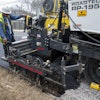



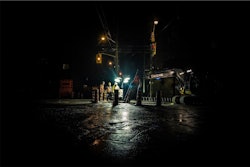
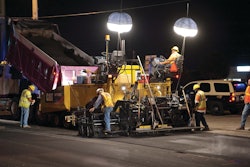
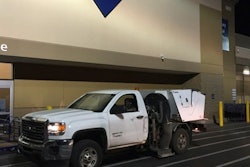




![Lee Boy Facility 2025 17 Use[16]](https://img.forconstructionpros.com/mindful/acbm/workspaces/default/uploads/2025/09/leeboy-facility-2025-17-use16.AbONDzEzbV.jpg?ar=16%3A9&auto=format%2Ccompress&fit=crop&h=135&q=70&w=240)



